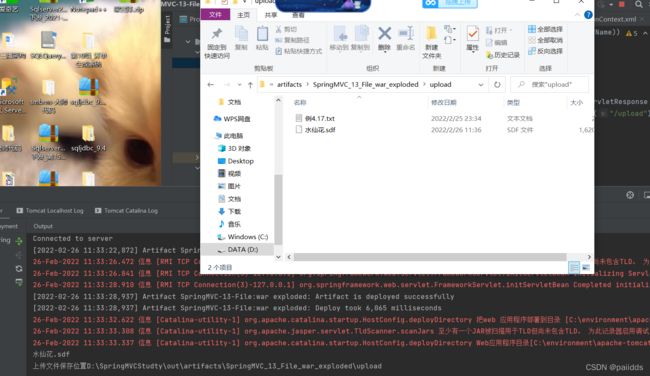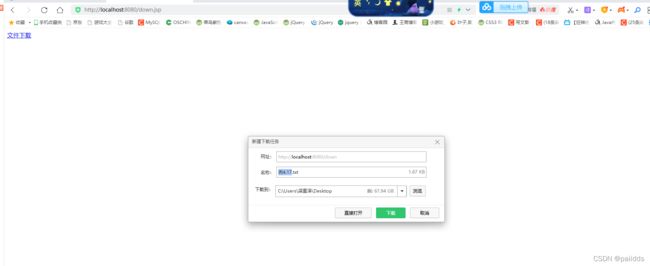SpringMVC-文件上传和下载
文件上传和下载
介绍
文件上传和下载是项目开发中的最常见的功能之一,文件上传是从浏览器中将文件以流的形式提交给服务器,文件下载是从浏览器请求服务器,服务器将web应用管理系统的文件资源提供给用户下载。
SpringMVC默认情况下不能处理文件上传工作,如需则要配置MultipartResolver。
前端表单enctype详细说明
-
application/x-www=form-urlencoded:默认方式,只处理表单域中的 value 属性值,采用这种编码方式的表单会将表单域中的值处理成 URL 编码方式。
-
multipart/form-data:这种编码方式会以二进制流的方式来处理表单数据,这种编码方式会把文件域指定文件的内容也封装到请求参数中,不会对字符编码。
-
text/plain:除了把空格转换为 “+” 号外,其他字符都不做编码处理,这种方式适用直接通过表单发送邮件。
注意
上传文件需要配置CommonsMultipartResolver,而一个MultipartResolver实现类是使用Apache Commons FileUpload技术实现的。所以pringMVC的文件上传还需要依赖Apache Commons FileUpload的组件。
文件上传:
1.导入文件上传的jar包
<dependencies>
<dependency>
<groupId>commons-fileuploadgroupId>
<artifactId>commons-fileuploadartifactId>
<version>1.3.3version>
dependency>
<dependency>
<groupId>javax.servletgroupId>
<artifactId>javax.servlet-apiartifactId>
<version>4.0.1version>
<scope>providedscope>
dependency>
<dependency>
<groupId>org.springframeworkgroupId>
<artifactId>spring-webartifactId>
<version>5.1.9.RELEASEversion>
<scope>compilescope>
dependency>
<dependency>
<groupId>org.springframeworkgroupId>
<artifactId>spring-contextartifactId>
<version>5.1.9.RELEASEversion>
<scope>compilescope>
dependency>
<dependency>
<groupId>org.springframeworkgroupId>
<artifactId>spring-webmvcartifactId>
<version>5.1.9.RELEASEversion>
<scope>compilescope>
dependency>
dependencies>
2.配置applicationContext.xml文件的multipartResolver
<bean class="org.springframework.web.multipart.commons.CommonsMultipartResolver" id="multipartResolver">
<property name="defaultEncoding" value="utf-8"/>
<property name="maxUploadSize" value="10485760"/>
<property name="maxInMemorySize" value="40960"/>
bean>
3.编写前端页面
<%-- multipart/form-data 以二进制形式传输--%>
4.Controller类
1.常规方法
@Controller
public class UploadFileDemo {
// @RequestParam(file)将name=file控件得到的文件封装成CommonsMultipartFile对象
//批量上传CommonsMultipartFile为数组即可
@RequestMapping("/upload")
@ResponseBody
public String uploadFile(@RequestParam("file")CommonsMultipartFile file, HttpServletRequest req) throws IOException {
//1.得到上传文件名
String ofName = file.getOriginalFilename();
if("".equals(ofName)){
//无上传重定向到index页面
return "null";
}
System.out.println(ofName);
//getServletContext()获取Servlet上下文对象
//2.req.getServletContext().getRealPath("/f") 给定一个URI,返回文件系统中URI对应的绝对路径,如果不能映射,则返回null
String path = req.getServletContext().getRealPath("/upload");
//如果路径不存在,则创建一个
File realPath = new File(path);
if(!realPath.exists())
{
realPath.mkdir();
}
System.out.println("上传文件保存位置"+realPath);
//获得文件输入流
InputStream is = file.getInputStream();
//获取文件输出流
FileOutputStream fis = new FileOutputStream(new File(realPath,ofName));
byte[] buffer = new byte[1024];
int len=0;
while((len=is.read(buffer))>0)
{
fis.write(buffer,0,len);
//刷新
fis.flush();
}
fis.close();
is.close();
return null;
}
使用file.Transto 来保存上传的文件
controller层编写
@RequestMapping("/upload2")
@ResponseBody
public String updateFile02(@RequestParam("file") CommonsMultipartFile file,HttpServletRequest req) throws IOException {
String ofName = file.getOriginalFilename();
System.out.println(ofName);
if("".equals(ofName)){
return "null";
}
String realPath = req.getServletContext().getRealPath("/upload");
//使用CommonsMultipartFile的transferTO直接上传文件
file.transferTo(new File(realPath+"/"+ofName));
return "null";
}
文件下载
@RequestMapping("/down")
@ResponseBody
public String downFile(HttpServletRequest req, HttpServletResponse resp) throws IOException {
String path = req.getServletContext().getRealPath("/upload");
//下载文件名
String fileName ="例4.17.txt";
//设置文本响应头
resp.reset(); //设置页面不缓存,清空buffer
resp.setCharacterEncoding("UTF-8"); //字符编码
resp.setContentType("multipart/form-data"); //二进制传输数据
resp.setHeader("Content-Disposition","attachment;fileName="+ URLEncoder.encode(fileName,"UTF-8"));
File file =new File(path,fileName);
//读取文件-- 输入流
InputStream is = new FileInputStream(file);
//写出文件--输出流
OutputStream os = resp.getOutputStream();
int len =0;
byte[] bf = new byte[1024];
while((len=is.read(bf))>0){
os.write(bf,0,len);
os.flush();
}
os.close();
is.close();
System.out.println("文件下载成功");
return null;
}
前端页面:
点击下载
测试结果
相比于Java web 的Servlet,来说非常的简洁,上传的时候只需要管理一个CommonsMultipartResolver的bean。

